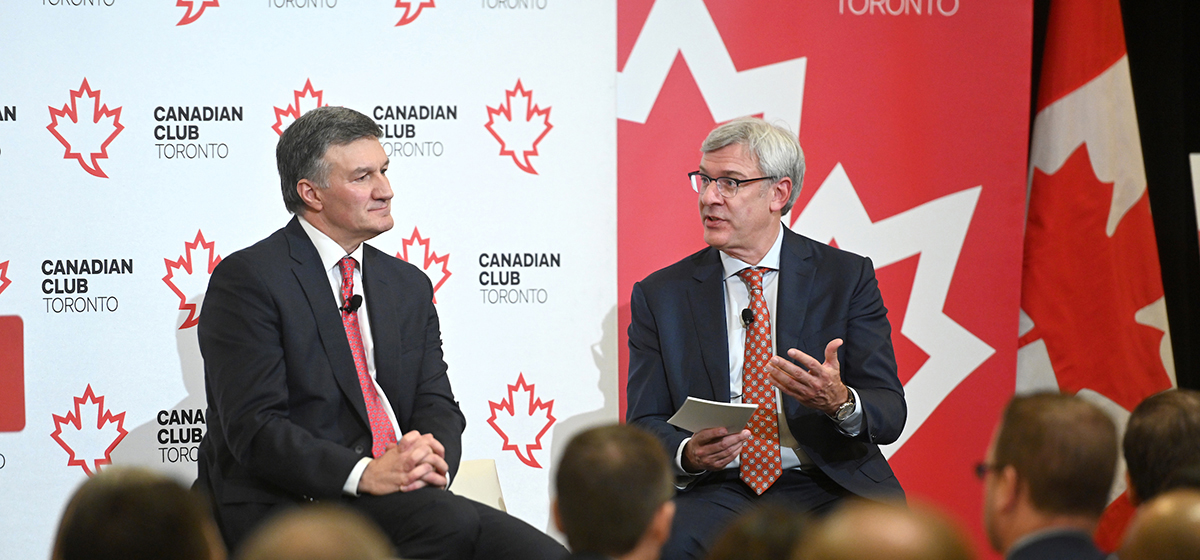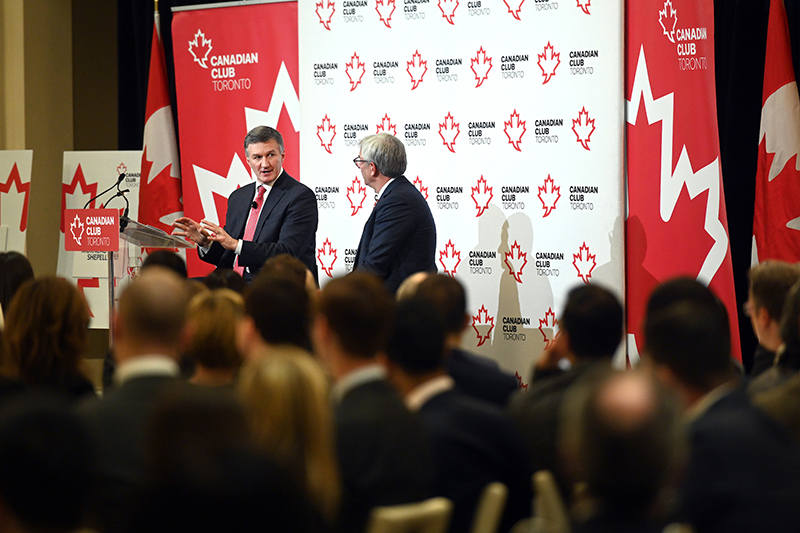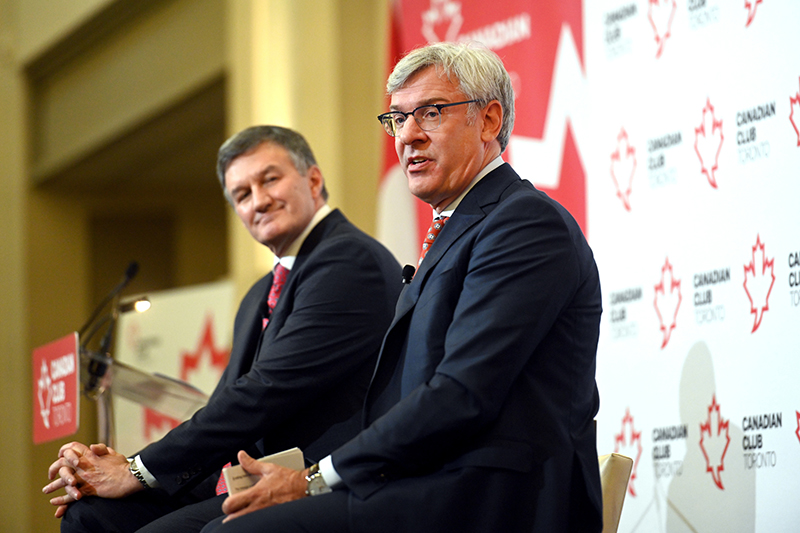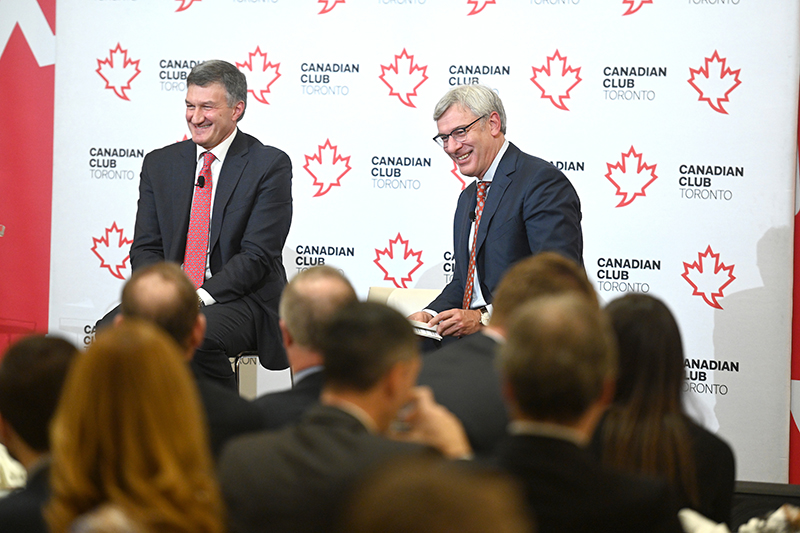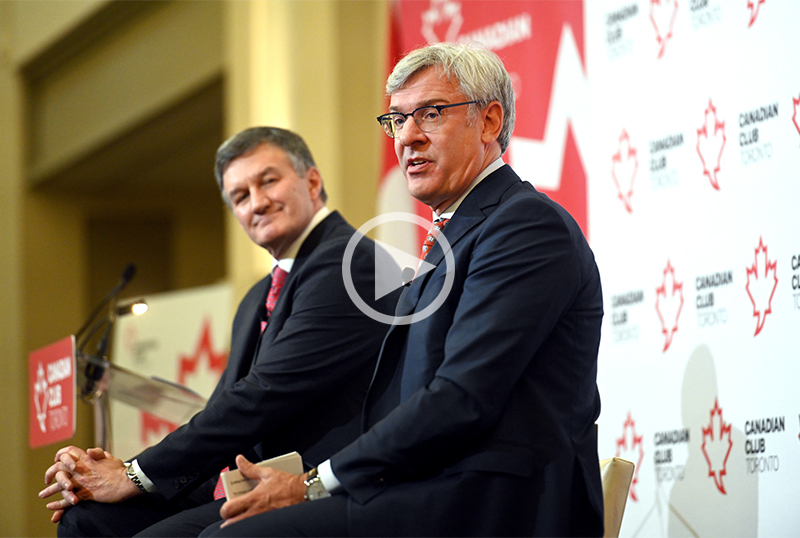We're putting our standard of living at risk if we don't develop a more balanced approach to harnessing Canada's energy future.
That was my message this afternoon on the Canadian Club of Toronto stage where I hosted an important conversation about our country’s energy future with Enbridge CEO Al Monaco.
During the discussion, we covered Canada’s competitive position in the energy world, including how the sector can better approach climate change issues, meaningful Indigenous reconciliation, regulatory and financing challenges, and the promise of a technology-led transformation of the industry.
I was struck by how optimistic Al was that energy development can be Canada’s next big project.
We certainly need this positive outlook.
As I travel the country and world, I’ve heard a shared sense of frustration and concern from business leaders, clients, and communities. Canadians are not happy with our inability to get things going and they’re telling governments they want an approach to energy that transitions Canada to a lower carbon footprint, while also helping every Canadian household maintain the quality of life they have come to enjoy.
There’s no doubt Canada is trying to reconcile competing ideas as we attempt to balance the need to reduce our carbon footprint, but also produce more energy to supply growing demand globally. But the reality is we’re entering the 2020s without a clear strategy to manage our energy resources and our consumption.
This is not a binary choice. We absolutely need to do both.
There may be no greater issue for Canadians and the country today. Investment in energy is critical to ensuring our country remains prosperous and sustainable for generations to come.
It matters. And here’s why:
1.The world is consuming more energy, and carbon emissions are rising too
The International Energy Agency (IEA) thinks global consumption of oil and gas will increase 27% by 2030 meaning that any production cuts from Canada will have no bearing on other country’s growth plans. At the same time, global carbon emissions hit a record last year and have risen over the last decade in most major countries. Business as usual simply won’t work.
2.Canada can supply a lot of that energy – cleanly, efficiently and progressively
We have the world’s third largest oil reserves after Venezuela and Saudi Arabia, but we aren’t exporting broadly to the world. In 2017, 99% of oil exports went to the U.S., while we imported close to 1 million barrels a day – with nearly two thirds of it from our neighbour to the south.
3.We won’t help the world meet its energy needs and move to cleaner fuel sources on our current path
Capital investment in Canadian oil and gas has dropped 49% since 2014. The delays and lack of clarity in building new infrastructure projects are creating price volatility, reducing our competitiveness, and causing global energy companies to stay away from our country. We can have the most positive impact on the planet’s carbon footprint by better investing in our resources and exporting cleaner and more efficient energy to the world.
4.Energy is part of Canada’s economic fabric, and is critical to funding our social needs
The sector accounts for 10% of our GDP and has benefited the economy in terms of jobs, investment, and national wealth. Over the last five years alone, the sector has contributed $90 billion to government revenues, which covers about 10% of what Canada spent on health care over that period.
5.With foresight, we can generate more energy, grow our economy and cut emissions too
RBC Economics estimates that with a careful but ambitious approach to growth in the sector, we could add another 1.1% to our GDP – akin to adding an entire auto sector. In this scenario, Canadian governments could earn another $195 billion in revenues between now and 2030, and investing that money in technology could also cut emissions by a third.
At RBC, we’re taking this conversation as seriously as any challenge – or opportunity – before our business. Our bank recognizes the important need to accelerate capital flows to our natural resource and energy sector clients, for energy innovation and clean technologies that will help boost efficiency and reduce emissions.
We have been very active in providing financing and advisory services to many companies in the renewable energy and clean tech sectors. And just a few weeks ago, we established a Sustainable Finance team within Capital Markets to support our corporate and institutional clients on this topic.
After today’s insightful conversation at the Canadian Club, I believe the path forward is right in front of us.
Our country must address the energy sector’s competitiveness challenges, including regulatory and infrastructure roadblocks. At the same time, we need to ensure that money is reinvested wisely in technologies that reduce our collective carbon footprint and make Canadian energy the cleanest, safest and most efficient in the world.
And to make that happen, we need government leaders to listen to the vast majority of Canadians who support our energy sector. That means choosing a path and prioritizing the delivery of cleaner, more efficient energy.
This can truly be our next big journey. We’re having the conversations. Our energy future is on the agenda. Now we need leaders to unite and make a more environmentally and economically sustainable energy sector happen.
Watch the Video (Run time 47:12 minutes)
Canadian Club of Toronto. Dave McKay, President and CEO of RBC, chats with Al Monaco, President and CEO of Enbridge, on Canada’s competitive position in energy and its future in the 2020s.
